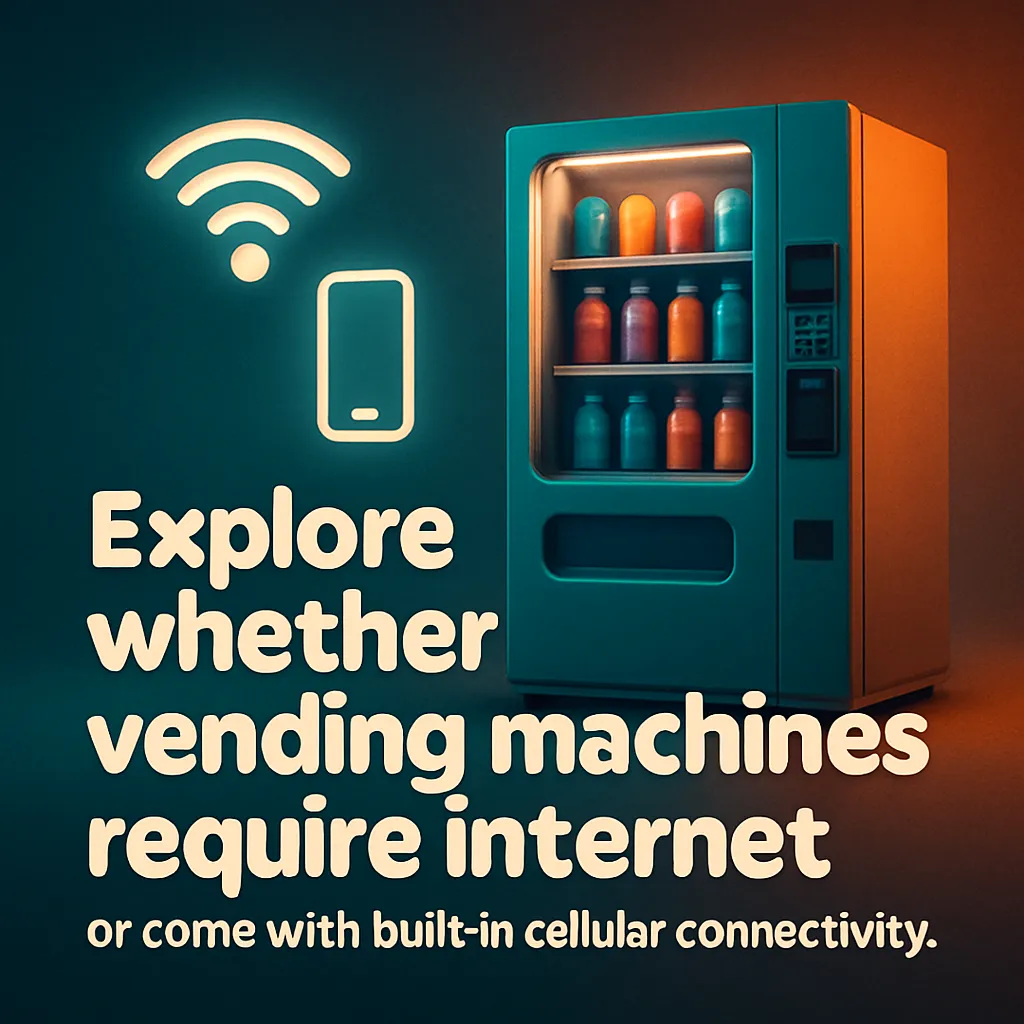Do Vending Machines Need Wi-Fi? Understanding Connectivity Requirements
Explore whether vending machines require internet or come with built-in cellular connectivity for optimal operation.
Back to Vending FAQs ResourcesExplore whether vending machines require internet or come with built-in cellular connectivity for optimal operation.
Back to Vending FAQs ResourcesToday's vending machines benefit immensely from internet access, whether through Wi-Fi or cellular networks, enabling features far beyond basic cash transactions.
![]() Real-time sales and inventory reporting
Real-time sales and inventory reporting
![]() Support for cashless and mobile payment systems
Support for cashless and mobile payment systems
![]() Remote monitoring and proactive maintenance alerts
Remote monitoring and proactive maintenance alerts

In the evolving world of automated retail, the question of "Do vending machines need Wi-Fi?" is becoming increasingly relevant. While traditional, cash-only machines can operate without any internet connection, the vast majority of modern vending solutions, particularly smart vending machines and AI coolers, rely heavily on connectivity to deliver their full suite of features and benefits. Understanding these requirements is crucial for businesses looking to implement efficient and profitable vending services.
Modern vending machines are sophisticated pieces of technology that do more than just dispense products. They can track inventory in real-time, process cashless payments, send detailed sales reports, and even alert maintenance teams to potential issues before they become major problems. All these advanced capabilities hinge on a stable internet connection. Whether it's Wi-Fi, Ethernet, or cellular data, connectivity transforms a simple dispenser into a smart retail hub. This shift is part of a broader trend towards understanding vending machine technology beyond basic mechanics.
The advantages of a connected vending machine are numerous. Real-time monitoring allows operators to know exactly what products are selling and when, helping them optimize stocking routes and minimize unsold inventory. Cashless payment systems, which require an internet connection to authorize transactions, significantly increase sales by catering to customers who rarely carry cash. Furthermore, remote diagnostics mean that many issues can be identified and even resolved without a physical visit, drastically reducing downtime and operational costs. For businesses, this translates into higher revenue and improved customer satisfaction. You can also explore how these systems help track sales and manage stock by learning about inventory tracking with AI coolers.
When it comes to providing internet access for a vending machine, businesses typically choose between Wi-Fi and cellular data. Wi-Fi can be convenient if a strong, reliable network is already available at the location. However, cellular connectivity (often 4G or 5G) is frequently preferred for its independence and stability, especially in environments where Wi-Fi signals might be unreliable or nonexistent. Cellular connections offer a dedicated, secure link for the machine's operations, though they usually involve a monthly data plan. Many locations choose cellular to avoid relying on existing, potentially unstable, local Wi-Fi networks. The decision often depends on the specific site requirements and the cost-benefit analysis. For instance, the connectivity needs for an AI vending cooler for hotels might differ from one in a remote construction site, making the choice of Wi-Fi or cellular critical. If you're exploring the future of automated retail, gaining insight into how smart vending coolers work is highly recommended.
No, not all vending machines require an internet connection. Traditional machines operate offline, while modern, smart vending machines often leverage connectivity for advanced features.
Modern vending machines use Wi-Fi or cellular data for real-time inventory tracking, remote monitoring, cashless payments, and sending sales data to operators. This enhances efficiency and uptime.
Smart vending machines typically offer Wi-Fi, Ethernet (hardwired internet), and cellular data (4G/5G) as connectivity options, with cellular being a popular choice for its flexibility.
Yes, for cashless payment systems (like credit/debit cards or mobile payments) to process transactions, a vending machine needs a reliable internet connection, often Wi-Fi or cellular.
Yes, basic vending machines that only accept cash can operate entirely without internet access. However, they lack advanced management features.
Connected machines offer benefits like remote monitoring of stock levels, real-time sales reports, predictive maintenance, and the ability to update pricing or promotions remotely.
Cellular connectivity often provides greater flexibility and reliability for vending machines, especially in locations without existing Wi-Fi or where a stable Wi-Fi signal is hard to maintain. It usually comes with a monthly data plan.
Internet connectivity enables remote diagnostics and alerts, allowing operators to address issues proactively, plan maintenance efficiently, and minimize machine downtime, leading to faster repairs.
Telemetry in vending machines refers to the automatic measurement and transmission of data from the machine to a central system. This requires an internet connection (Wi-Fi or cellular) to send information like sales, inventory, and error codes.
Yes, AI vending coolers heavily rely on internet connectivity, typically Wi-Fi or cellular, for their advanced features like computer vision for inventory, touchless checkout, remote management, and real-time data processing.